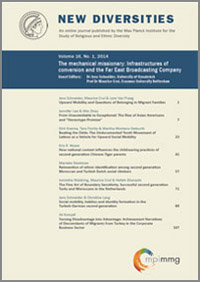Religion and Migration in Morocco: Governability and Diaspora
by Ana I. Planet Contreras (Workshop of International Mediterranean Studies (TEIM), Universidad Autónoma de Madrid) and Miguel Hernando de Larramendi Martinez (Study Group on Arab and Muslim Societies (GRESAM), Universidad de Castilla-La Mancha)
To cite this article: Planet Contreras, A. I., & Hernando de Larramendi Martinez, M. (2015). Religion and Migration in Morocco: Governability and Diaspora. New Diversities, 17(1), 111–127. https://doi.org/10.58002/vr9c-ky45
This article analyses recent Moroccan policies towards its emigrants using Spain as the observation site and the religious arena as the specific focus. Given that the framework for analysing migration and transnationalism has become progressively more complex, the study of Moroccan policies regarding migrants must include –among the many factors that combine to preserve ties with the country of origin– a more detailed and dynamic analysis of religion. This includes examining changes in policies designed to manage religious questions in the current Moroccan context and the material and symbolic efforts made to sustain Moroccan/Muslim citizens in the diaspora. All of these entanglements of citizenship and religion are affected by debates and policies in the specific local and national contexts where migrants settle and is enriched by the commitments made by individual migrants and their descendants on a daily basis and by unstoppable processes of de facto incorporation as citizens in host countries.
The most recent constitutional reform in Morocco, carried out at the behest of the king in 2011 in the context of the Arab Spring, maintained Islam as the country’s official religion along with the principle of freedom of religion. This reform upheld the symbolic role of the Moroccan monarchy in religious terms and the reference to its Sherifian origins. Several efforts have been made to promote an Islam that is suitable for all citizens, with inherent tensions between more and less moderate views. Morocco has also been receptive to the arguments and needs of Moroccans living abroad regarding religion.
Keywords: Morocco, Sociology of religion, religious politics, 2011 constitutional reform, diaspora politics, Moroccans in Spain
|
